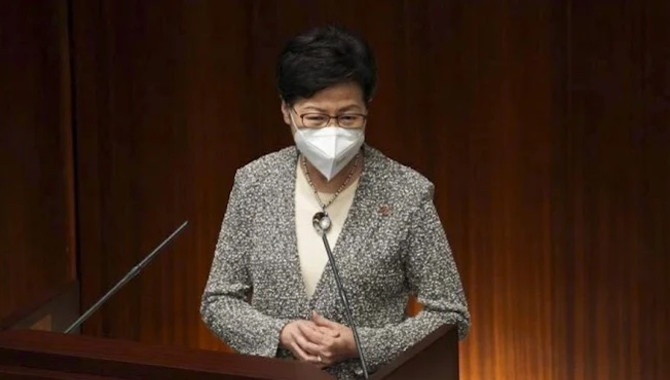
Hong Kong's chief executive Carrie Lam yesterday (9 June) met members of the Legislative Council for her last Q&A session before she steps down at the end of the month.
Among the 25 questions posed during the 97-minute session transport sector lawmaker Frankie Yick asked Ms Lam if she could persuade her successor to set up a shipping and port authority under the next administration. But, of course it was too late.
Ms Lam said, as the Transport and Housing Bureau will be split into a transport and logistics bureau and a housing bureau, she thinks that the new transport minister will be working with Yick and other stakeholders on their concerns.
Rewind five years to early 2017, when Ms Lam told Mr Yick and other stakeholders that she would oversee the separation of the transport and housing departments. To her credit she has…just. The departments in question are frantically scrambling to have the division completed for 1 July and the advent of the John Lee administration.
The idea of some form of statutory body for the port and maritime sector was also raised at the 2017 meeting of the industry with Ms Lam. Today, despite five years of active lobbying by successive chairs of the Hong Kong Shipowners Association and other industry notables such as Wah Kwong’s executive chairman Hing Chao, no progress has been made toward this potentially game-changing objective.
Still, progress in other areas were made during the Lam regime, most obviously the tax concessions for ship leasing firms and marine insurers. A second round of tax concessions, this time for ship managers, ship agents and shipbrokers, are scheduled to be implemented this year.
Introduced with the aim of attracting more ship leasing and marine insurance to the territory, the attractiveness of such concessions are yet to be truly tested, due to the persistent presence of Covid in the territory, and the effective closure of the territory's borders, which is sure to have put a damper on international companies seeking to take advantage.
Other initiatives benefitting Hong Kong's maritime sector during Ms Lam's tenure include: regional desks for the Hong Kong Shipping Register in Shanghai, Singapore London and Sydney, with further offices due in North America and Tokyo.
The Maritime and Aviation Training Fund was also boosted to HK$200m in 2018, along with a broader ambit when considering the subvention of fees for courses other activities likely to promote Hong Kong maritime awareness.
In October 2021, the chief executive used her last policy address to announce a drive to promote wider application of digital technology in business processes and operations by the maritime and port industry for the development of a “Smart Port”. A Task Force set up at the Hong Kong Maritime and Port Board is currently working on the details.
It is perhaps a measure of the competitiveness of Hong Kong's rivals as maritime centres that when the incumbent chief executive first took the helm in 2017, the Menon Economics and DNV report, Leading Maritime Cities of the World, placed Hong Kong fifth in the world. In 2022 that year's report found Hong Kong in seventh place.
Source:
Hong Kong Maritime Hub
The opinions expressed herein are the author's and not necessarily those of The Xinde Marine News.
Please Contact Us at:
media@xindemarine.com


 Ningbo Containerized Freight Index Weekly Commentar
Ningbo Containerized Freight Index Weekly Commentar  Ningbo Containerized Freight Index Weekly Commentar
Ningbo Containerized Freight Index Weekly Commentar  Ningbo Containerized Freight Index Weekly Commentar
Ningbo Containerized Freight Index Weekly Commentar  BIMCO Shipping Number of the Week: Bulker newbuildi
BIMCO Shipping Number of the Week: Bulker newbuildi  Ningbo Containerized Freight Index Weekly Commentar
Ningbo Containerized Freight Index Weekly Commentar  Ningbo Containerized Freight Index Weekly Commentar
Ningbo Containerized Freight Index Weekly Commentar